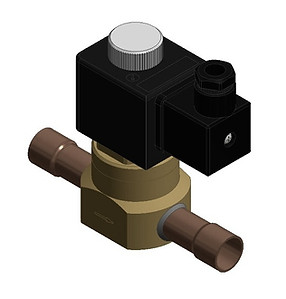
Servo-controlled valves
Efficient control for systems
with existing differential pressure.
The operating principle: Intelligent and energy-saving
Servo-operated (also known as pilot-operated) solenoid valves cleverly utilize the existing pressure of the medium to switch. The solenoid actuator only controls a small pilot hole, after which the system pressure takes over the main work and opens the diaphragm or piston. This principle makes them ideal for switching large flow rates, provided a stable minimum pressure difference is maintained in the system.


160
servo-controlled with separating membrane
Design 2/2-way
Actuation type servo-controlled
Nominal diameter 15.0 mm - 50.0 mm
Pressure range 0.3 - 6.0 bar
KV value 3.1 - 29.6 m³/h
Housing material PVC, PP, PTFE
Connection adhesive socket, welding socket, threaded socket
216 DN5-LR
Powerful CO2 valve
2/2-way design
Actuation type servo-controlled
nominal diameter 5.0 mm
Pressure range 0.1 - 130.0 bar
KV value 0.3 - 0.4 m³/h
Housing material stainless steel V2A
sealing material HNBR
seat seal special PTFE
Temperature Medium-40 to +150°C
ConnectionLM: solder sleeve, LM6, LM10, LM12, LM1/4, LM1/2
Technical details and areas of application
-
To help you make an informed choice, you will find an overview of the key features of servo-controlled valves here.
Advantages:
-
Energy efficiency: Since the medium does the main work, only small, energy-saving magnets are required.
-
For large flow rates: The principle enables reliable switching of large nominal diameters and high volume flows.
-
Less wear: The magnetic actuator is subjected to less stress, which leads to a longer service life of the valve.
-
Cost-effectiveness: Low energy consumption and longevity make them an economical choice.
Disadvantages:
Requires minimum pressure difference: Without sufficient pre-pressure (usually 0.1 - 0.5 bar) the valve cannot open or close.
-
Not suitable for vacuum: Due to the required pressure difference, they are unsuitable for vacuum applications.
-
Slightly slower response time: Pressure build-up takes a short moment, so they are not quite as fast as direct-acting valves.
Typical applications
Irrigation systems: Ideal for controlling water flow in agricultural or garden systems using pump pressure.
-
Heating and cooling systems: For controlling hot or cold water circuits with constant pressure conditions.
-
Industrial process control: In systems where liquids are moved with stable pressure (e.g. water treatment, chemicals) .
Maintenance and installation
-
Correct flow direction: Installation must be carried out in the flow direction marked on the housing.
-
Check pressure conditions: Ensure that the minimum differential pressure in the system is maintained at all times
"Maximum efficiency and minimal wear – servo-controlled solenoid valves for reliable and energy-saving control in every application."
Your contact for high-quality and reliable valve solutions.
WE SAY THANK YOU TRUST FOR ALMOST 70 YEARS .

















